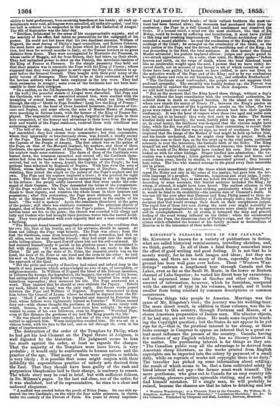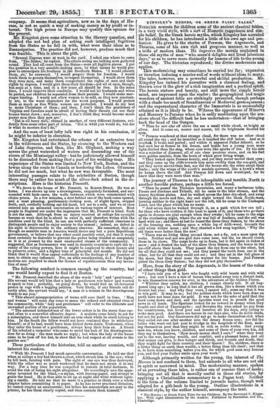KINGSTON'S PLEASURE TOUR IN THE CANADAS.. Mr. KINGSTON is known
for a variety of publications in fiction, what are called historical reminiscences, travelling sketches, and, we think, poetry. In all of them a fatal fluency somewhat 'mars the effeet of good writing and good feeling. It is not that he is merely wordy, for he has both images and ideas; but they are common, and there are too many of them, especially where the ground has been well gone over before. These "Western Wan- derings" embrace a lengthened tour through Canada and the Lakes, even as far as the Sault St. Marie, in the lower or Eastern channel of Lake Superior; he varied his direct tour by excursions; and he sojourned some time at Quebec and other cities. The amount of information, however, which he furnishes, compared with the amount of type in his volumes, is small, and it looks smaller from being overlaid by common descriptions or common occurrences.
Various things take people to America. Marriage was the cause of Mr. Kingston's visit; the journey was his wedding-tour. The more direct result, in addition to these volumes, was the in- troduction to this country, through Fortnum and Mason, of a choice American preparation of Indian corn. His ulterior objects, if he had any, are not very clear. He made some inquiries touch- ing the Copyright question; but the States do not appear to be yet ripe for it,—that is, the piratical interest is too strong, or there lacks courage in Congress to oppose an interest that to a great ex- tent must influence the presses of the country. Canada, having few authors of any English celebrity, has no literary interest in the matter. The purchasing interest is for things as they are. "The Canadian public reap all the advantage to be derived from American cheap literature, as the works printed from English copyrights can be imported into the colony by payment of a small duty, while on reprints of works not copyright there is no duty." The traveller has picked up some information about settling; the result of which seems to be, that a farm cultivated solely by hired labour will not pay—the farmer must work himself. The mere gentleman, who goes out to Canada for an easy country life of shooting, pleasure-parties, agreeable visiting, and so forth, will find himself mistaken. If a single man, he will probably be ruined, because the chances are that he takes to drinking and low • Western Wanderings; or a Pleasure Tour in the Canada,. By William H. G. Kingston, Author of " The Prime Minister," "Lusitanian Sketches," &c. &e. In two volumes. Published by Chapman and Hall, London; Dawson, Montreal. company- It Seems that agriculture, now as in the days of Ho- raoe, is not so quick a way of making money as by profit or in- terest. The high prices in Europe may qualify this opinion for the present.
M. Kingston gave some attention to the Slavery question, and adopted the not bad plan of asking such intelligent fugitives from the States as he fell in with, what were their ideas as to Emancipation. The practice did not, however, produce much that was feasible. This is about the pith.
"Several Negroes were at work in the yard. I asked one where he came from. 'The States,' he replied. The others seeing me talking soon gathered round. They had all come from the States—were all fugitive slaves. I put the question to a very sensible-looking man, by what means he would pro- pose to emancipate his brethren in the Southern States. would educate them, sir,' he answered. 'I would prepare them for freedom. I would teach them to govern themselves, to respect themselves. I would show them they were men, and make them comprehend the rights of men and their rights by degrees. I would give them their freedom—not all at once, though, i
but some at a time, and n a few years all should be free. In the mean time, I would improve tfieir condition. I would not let husbands and wives be parted, nor children be separated from their parents. I would make mar- riages binding. I would not allow women to be sold, as they now constant- ly are, to the worst characters for the worst purposes. I would protect them as much as free White women are protected. I would do my best to make Christians of them ; and then, I don't think the gentlemen of Virginia and Carolina need be afraid of having their throats cut nor their houses burnt down • and, moreover, I don't think they would become much poorer men than they now are.' 'pat is all berry well,' chimed in another, of very different features, evi- dently from some other part of Africa. 'Dot is what you would do, but dat is what de masters don't do."
And the man of least lofty talk was right in his conclusion, if he might be inferior in elocution.
Mr. Kingston had entertained the scheme of an extensive tour in the wilderness and the States by steaming to the Western end of Lake Superior, and then, like Mr. Oliphant, making a way across the great watershed of waters and descending one of the rivers of the Mississippi valley : but he judiciously allowed himself to be dissuaded from making that a part of his wedding-tour. His experience of the States was limited to New York, Boston, and the towns along the route to Canada or bordering the Lakes. Of course he did not see much, but what he saw was favourable. The most interesting passages relate to the celebrities of Boston, though there may be rather too much of the silver-fork school in the de- scriptions. Here is the historian Prescott.
"We drove to the house of Mr. Prescott, in Beacon Street. He was at home. I was shown up into a drawingroom, exquisitely furnished, and sur- rounded with book-cases, the walls between which were ornamented with choice prints. In a few minutes, a door behind one of the book-cases opened, and a most pleasing, gentlemanly-looking man, of slight figure, stepped forth, and, cordially holding out his hand, led me to a sofa, and we at once entered into an animated conversation on various topics of interest. Most people in England are under the impression that Mr. Prescott is blind. Such is not the ease. Although from an injury received at college his eyesight became so weak that he is afraid to exert it, and therefore writes with the machine used by the blind, he can see with perfectly sufficient clearness to distinguish people and to enjoy society to the utmost ; indeed, no defect in his sight is discoverable to the ordinary observer. He remarked, that al- though no sensible man in America would desire any but a pure Republican government, or believe that any other could possibly exist, yet that it would most certainly be desirable to prevent the power being wielded so completely as it is at present by the most uneducated classes of the community. I suggested, that as freemasonry was used in despotic countries to curb the ty- ranny of the ruling powers, here it might be employed to check licence and to preserve order, and a higher tone of principles and morals. He did not think that it would thus appeal sufficiently to the feelings of any number of men to obtain any influence. Nor, on after consideration, do I. Far higher motives are required to check the licence of republicanism than any inven- tion of man."
The following conduct is common enough up the country, but one would hardly expect to find it at Boston.
"With Mr. Prescott I had much agreeable conversation. He told me that when at college a boy had thrown a crust, which struck him in the eye; when he fell back, fainting with pain. The sight of one eye was thus destroyed, while the other was so much weakened that he dares not strain it in any way. For a long time he was compelled to remain in total darkness, to avoid the risk of losing his sight altogether. He accordingly uses the appa- ratus invented for the blind,—a stylus, with tracing-paper, and strings to guide the hand. He is thus able to sit up at night and write without light- ing a candle. He told me that he made it a practice to think over a whole chapter before committing it to paper. As he has never practised dictation, he cannot employ an amanuensis ; but before his manuscripts are sent to the printer, he has them clearly copied, and then corrects them himself." " Mr. Prescott described the abuse of the words lady ' and gentleman.' His servant would tell him that a lady or gentleman was below and wanted to speak to him ; probably, on going down, he would find an ill-favoured person in rags with a begging petition. Very likely, if any friends call di- rectly after, the servant would say, 'A man or a woman in the drawingroom wants to see you.' " This absurd misappropriation of terms will cure itself in time. Man earth have not been done for gold. It was not for the sake of goal that the and woman' will some day come to mean the refined and educated class of Lord came down and died, and the Apostles went out to preach the good the community, while ' lady and gentleman ' will refer to the illiterate and news in all lands. The Spartans looked for no reward in money when they
unwashed portion of the population, fought and died at Thermopylce ; and Socrates the wise asked no pay from
"The assumed independence of the lower orders is in the mean time car- his countrymen, but lived poor and barefoot all his days, only caring to tied often to a somewhat offensive degree. A mulatto came lately to ask for make men good. And there are heroes in our days also, who do noble deeds, a.subscription, and threw himself into an arm-chair while he stood talking to but not for gold. Our discoverers did not go to make themselves rich when him. In the South the fellow would not have ventured thus to misbehave they sailed out one after another into the dreary frozen seas; nor did the himself; or if he had, would have been kicked down stairs. Tradesmen, when ladies who went out last year to drudge in the hospitals of the East, mak- they.enter the house of a gentleman, always keep their hats on. A friend ing themselves poor that they might be rich in noble works. And young of his rebuked a carpenter who came to mend the lock of his drawingroom- men too, whom you know, children, and some of them of your own kin, did door for so doing : the man made no reply ; but when the lady of the house i they say to themselves, How much money shall I earn ? when they went came in he took off his hat, to show that he had respect at all events to the out to the war, leaving wealth, and comfort, and a pleasant home, and all gentler sex." that money can give, to face hunger and thirst, and wounds and death, that These particulars of the historian, told on another occasion, will they might fight for their country and their Queen ? No, children, there is
interest his readers.



























 Previous page
Previous page